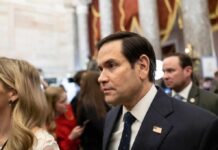
Donald Trump Jr. warns Eastern European nations to choose American economic partnerships over growing Chinese influence during a closed-door business forum in Budapest.
At a Glance
- Trump Jr. conducted a roadshow titled “Trump Business Vision 2025” in Budapest, urging closer US-Eastern European economic ties
- He stated that China poses a bigger threat than Russia to the Eastern European region
- The former president’s son expressed admiration for Hungarian PM Viktor Orban’s nationalist policies
- Hungary has welcomed significant Chinese investments including a BYD manufacturing plant
- Trump Jr. plans to continue advocating for US partnerships across Serbia, Bulgaria, and Romania
Trump Jr. Urges Eastern Europe to Choose American Partnerships
Donald Trump Jr. delivered a stark message to Eastern European business leaders during a closed-door forum in Budapest, advocating for stronger economic ties with the United States while warning against China’s growing regional influence.
The meeting, reported by Portfolio news website, was organized with Hungarian entrepreneurs as part of Trump Jr.’s “Trump Business Vision 2025” roadshow that aims to strengthen American business relationships across Eastern Europe. His visit comes amid increasing Chinese investment in the region, particularly in Hungary under Prime Minister Viktor Orban’s leadership.
During the forum, Trump Jr. didn’t mince words about what he perceives as the greatest challenge facing Eastern European nations. “Trump Jr., who’s holding a roadshow headlined ‘Trump Business Vision 2025,’ said China posed a bigger threat than Russia to the region,” according to reporting from Bloomberg.
This assessment marks a significant shift from traditional American foreign policy rhetoric in the region, which has typically focused on Russian influence as the primary concern.
Chinese Investment vs. American Partnership
The timing of Trump Jr.’s Eastern European tour comes as Chinese economic involvement in the region reaches unprecedented levels. Hungary has become a particularly notable recipient of Chinese investment, including major projects like BYD’s electric vehicle manufacturing facility and the Budapest-Belgrade railway, which represents a key segment of China’s ambitious Belt and Road Initiative. These developments highlight the strategic importance China places on establishing economic footholds throughout Eastern Europe.
This message aligns with broader concerns among American policy experts about China’s expanding global economic influence and the potential security implications of such investments. Trump Jr.’s efforts appear aimed at countering China’s economic diplomacy with an American alternative, emphasizing traditional alliances and partnerships that have historically defined transatlantic relations. The approach mirrors some of the economic nationalism that characterized his father’s presidency, particularly regarding competition with China.
Regional Tour and Future Outlook
Following his Budapest engagement, Trump Jr. is expected to continue his “Trump Business Vision 2025” roadshow across Serbia, Bulgaria, and Romania. The tour reflects a strategic focus on Eastern Europe, a region where Chinese influence has grown considerably in recent years through infrastructure projects, manufacturing investments, and increased trade relationships. By directly engaging with business leaders in these countries, Trump Jr. appears to be working to reinvigorate American economic diplomacy in a region that has seen competing influences from both East and West.
Trump Jr.’s admiration for Hungarian Prime Minister Viktor Orban adds another dimension to his Eastern European outreach. Orban’s nationalist policies have frequently aligned with positions advocated by the Trump family, creating potential synergies for closer cooperation. However, this relationship is complicated by Hungary’s simultaneous embrace of Chinese investment under Orban’s leadership, illustrating the complex economic and geopolitical calculations facing Eastern European nations as they navigate relationships with both American and Chinese business interests.

























